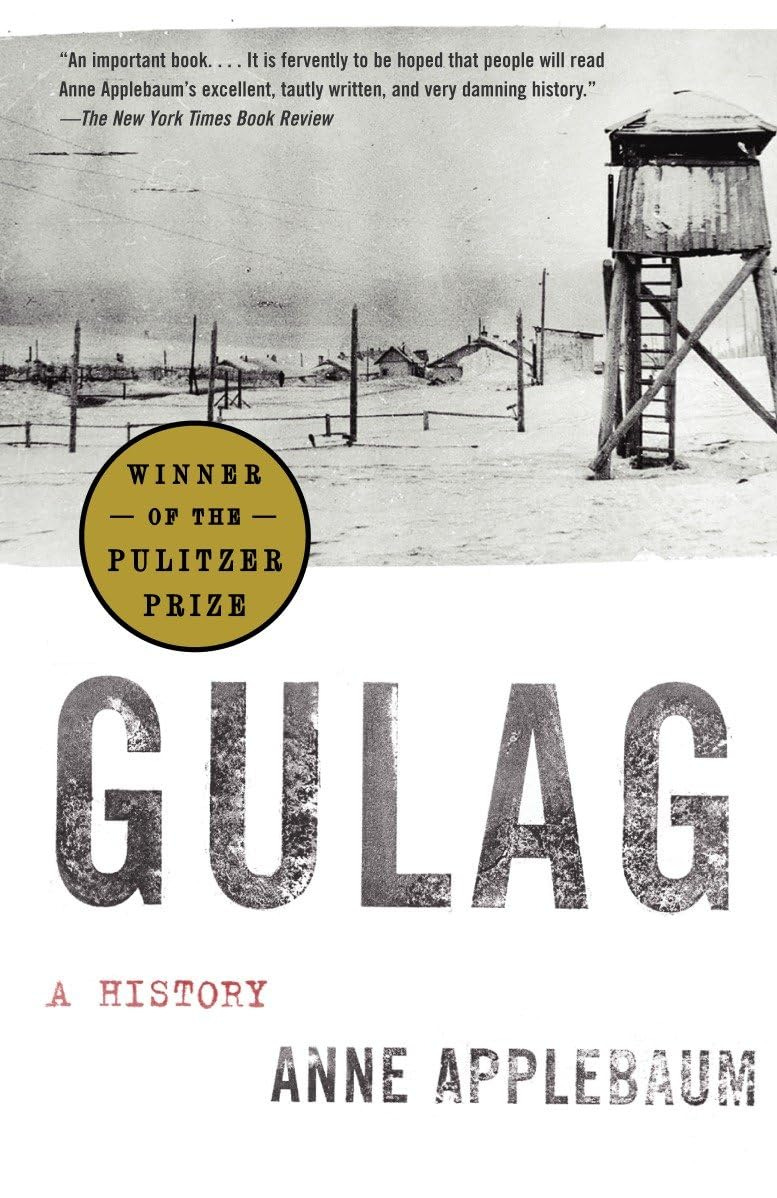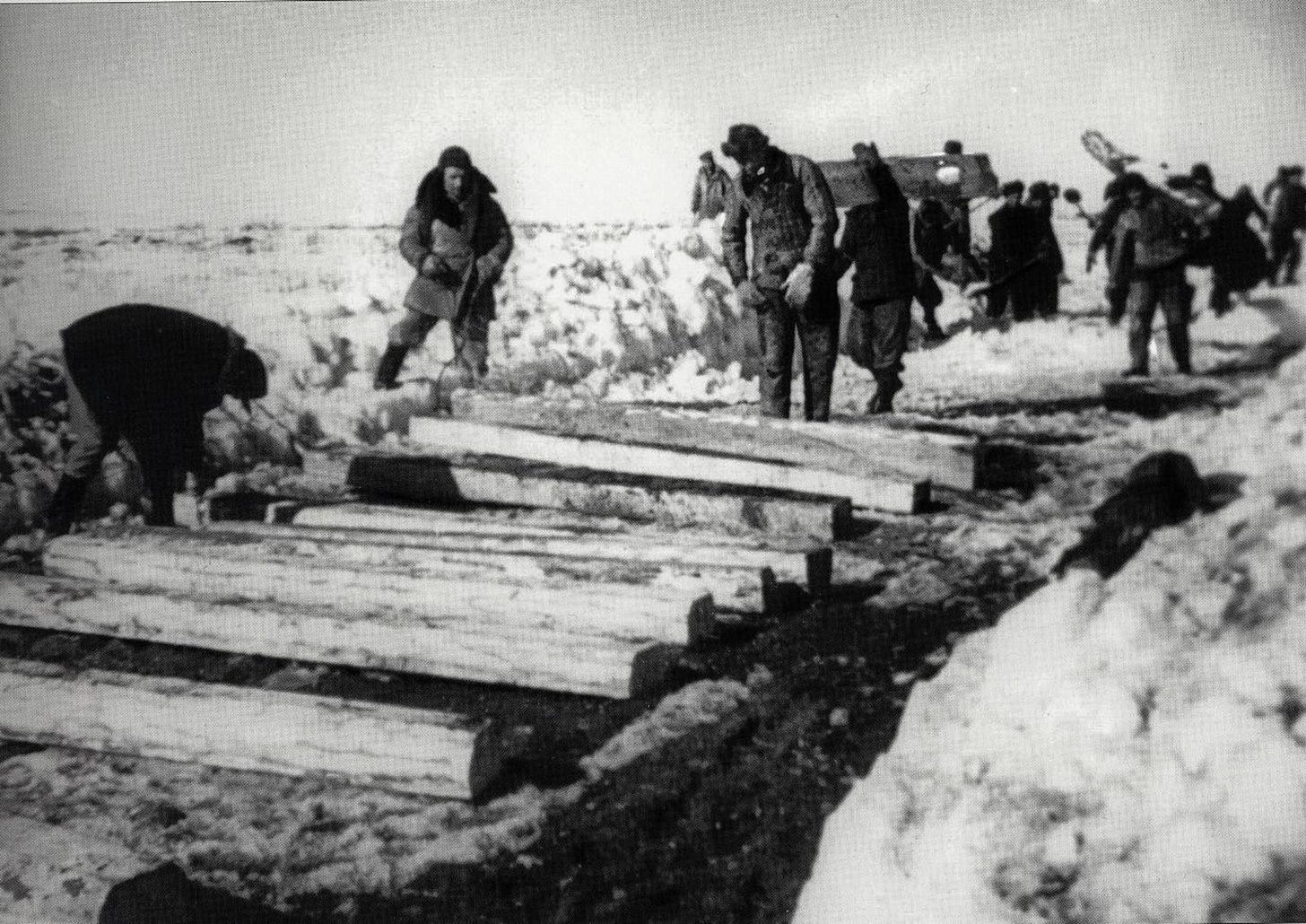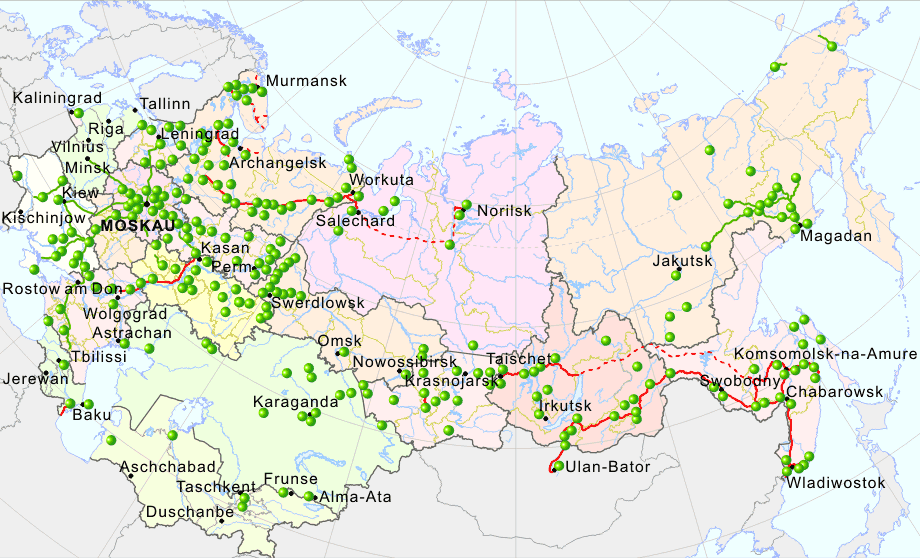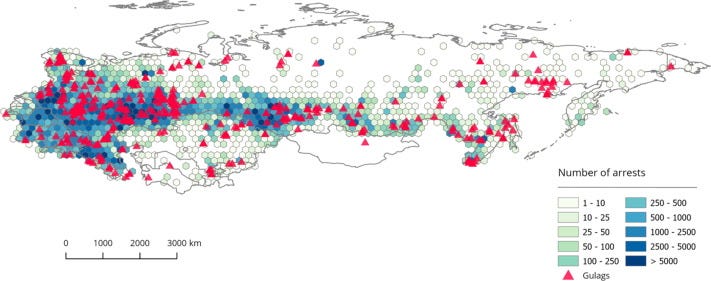Hell on Earth
Reflections on the GULAG and Soviet Society
What the decades-long system of Soviet slavery can teach us about government, power, and ideology.
The excerpts and information in this essay are taken from ‘Gulag: A History’, by Anne Applebaum
We collectively regard the Nazi regime as a kind of epitome of political evil - aggression, secret police, industrial murder and body disposal. We’ve been conditioned, through careful education and dozens of compelling, brilliant films, to imagine something like this when we think of the Third Reich:
But what if I told you that there was a worse political model? What if I told you that there was another twentieth century belligerent which was more murderous, more indiscriminate, crueler, more irrational, larger, more populous, and longer lasting? I’m referring, of course, to the Soviet Union.
Why is there such a low general understanding of the atrocities of communism (which were hardly limited to the Soviet Union)? One major reason is that communism/socialism is the intellectual soil out of which the progressive worldview grows. Most progressives aren’t communists, but progressives tend to regard socialism with a kind of warm regard, ignoring the fatal reality that every time such systems digest an entire country, mass oppression and starvation and political violence result. People are never more unethical than when they believe that they’re justified, and socialism justifies everything done in the service of its political vision. Worse, it erects a system of complete social power, controlled in secret by only a few, and it forces all others to cower before these men (usually distinguished only by their ambition and their cruelty) and to depend upon them for everything: job, home, freedom, status.
There are other reasons for the public ignorance though. Jews are an extremely influential minority in the United States. If there was a large Kulak or White Russian lobby in this country we might hear more about the Soviet crimes against their own people (there are Polish and Ukrainian people, of course - but their ancestors mostly left Europe before the Soviet Union came into existence). Also, the USSR was our ally in World War 2, which we mythologize as the foundational event of American power and righteousness. The idea that the defeat of the Nazis delivered half of Europe into darkness and oppression for four decades generates a kind of unpleasant cognitive dissonance for most Americans.
The Soviet Union began in chaos and political radicalism, turned into an ideological vanity project, then morphed into a vast dingy anthill of drab and rickety cities (supported by a millions-strong and largely invisible network of slave colonies - the GULAG), and finally transitioned into a kind of process-obsessed hyperbureaucracy (similar in many ways to our own).
In the final iteration, the leadership and the party organs and the government agencies still parroted all of the ideological slogans and Leninist koans, but by then few believed them. The elite had long ago been dominated by a cynical, greedy, thoroughly immoral class of apparatchiks, and everyone knew it. In that sense (the false-idealistic and endlessly ambitious elite, the empty slogans and the pointless, wasteful government activities) we have come to resemble the Soviet Union in many respects. Perhaps that’s why I’m so fascinated with it.
The project of Soviet Communism took a rapidly developing, culturally distinct, Eurasian Christian country and wiped away its religion and most of its culture, and replaced it with a set of political orthodoxies and organizational forms, which flew in the face of basic economics and human psychology. It absorbed dozens of neighboring cultures (Poles, Chechens, Tatars, Lithuanians, etc.), and obliterated them as well, in many cases starving most of their members, or shipping them en masse to deserts or desolate Siberian wastes, for no apparent reason.
To be a Soviet citizen was to publicly agree that innocent people were guilty, that a corrupt and malign state was the ultimate good, and that the infinitely precious (to them) lives of themselves and their families were actually meaningless when weighed against the great and urgent project of communism. But to be a political prisoner in the GULAG (a ‘zek’) was to be an unperson, an enemy of the people, more despised and abused than murderers and madmen and rapists.
Zeks [GULAG prisoners] were no longer considered full citizens of the Soviet Union, if they were considered people at all.
Why were such people punished? They were punished because the state said they should be. In most cases there was no other answer available. A great many of them were ardent communists (including many foreign Comintern members and emigres to the USSR) but that was irrelevant. The individual - his beliefs and actions and character - truly did not matter. Many socialists around the world have since defended this nihilistically collectivist mindset, and some still do, but none of them have ever been its victim.
[T]his, finally, is what links the camps of the Soviet Union and those of Nazi Germany in the most profound sense of all: both regimes legitimated themselves, in part, by establishing categories of “enemies” or “sub-humans” whom they persecuted and destroyed on a mass scale.
Hannah Arendt wrote that both the Nazi and the Bolshevik regimes created “objective opponents” or “objective enemies” whose “identity changes according to the prevailing circumstances - so that, as soon as one category is liquidated, war may be declared on another… [T]he task of the totalitarian police is not to discover crimes, but to be on hand when the government decides to arrest a certain category of the population.”
That was the central lie upon which the Soviet system was founded: a new and empty ethical system, where compliance with the nonsensical and mysterious dictates of the state was equated with virtue (even if the compliant were vicious and greedy and cruel). In this system, displeasing the state (even when the causes were confused or mysterious) was the worst offense. Ultimately, very people actually believed in this ethical scheme, but they all pretended to. That was the foundational lie upon which Soviet totalitarianism was founded.
[T]he “crimes” for which people were arrested, tried, and sentenced were nonsensical, and the procedures by which people were investigated and convicted were absurd, even surreal.
For many of the participants, the surreality felt intentional. It was as if the state was mocking them with its blatant lies, and demonstrating its power by making everyone (the victim’s family and friends and coworkers) agree with the lies… or risk the same themselves.
Evgeniya Ginzburg… watched as her childhood friend Nalya “recited like a parrot,” accusing her of membership in the Troskyite underground.
Many of those friends and family were eventually fed into the “meat grinder” (the Soviet idiom for the GULAG). Eventually, so were many of the system’s architects and controllers. Ideologies, applied, often end up eating their creators.
According to Wikipedia, “the word ‘Gulag’ is of Russian origin, derived from the acronym GULAG (ГУЛАГ), which stands for ‘Glavnoe upravlenie lagergermany)’, or ‘Main Directorate of Corrective Labor Camps’.” The GULAG system was established as soon as the Bolsheviks won power in the Russian revolution (on the model of the old Czarist exile outposts and penal work colonies) and it expanded quickly. According to Anne Applebaum, “by the end of 1919 there were twenty-one registered camps in Russia. At the end of 1920 there were 107, five times as many.” At its height the GULAG system included mines, lumber harvesters, road- and dam- and railroad-builders, aircraft manufacturers, fishermen, scientists, planners, and doctors. And many more. There were perhaps 2 million people in the system at its height around 1950, but the turnover was such that 15-20 million Russians were either in the camps or had been for most of the history of the USSR.
The fundamental thing to understand about the GULAG is that it was, ultimately, the most perfect manifestation of socialism: pure state power, unlimited by reason, law, ethics, or institution. It turned Soviet citizens into criminals and enemies, simply by labelling them as such, and then it made all of society believe that they were criminals and enemies as well (or behave as if they did). It dehumanized the prisoners, but also the guards and administrators and planners completely, by forcing them to perpetrate the worst brutalities on their fellow men, simply in order to win promotions or get some praise from a supervisor… or to avoid being imprisoned or shot themselves.
The Soviet system destroyed the soul of the nation’s people, by forcing everyone to assent and support a system of lies so extensive that they consumed the country. Participation in such an anti-true and immoral system degraded everyone.
Many survivors… have tried to explain this grotesque treatment of prisoners at the hands of young, inexperienced convoy guards, who were far from being the trained killers deployed in the prison system. Nina Gagen-Torn speculated that “it wasn’t evidence of evil, just the complete indifference of the convoy. They didn’t look at us as people. We were living cargo.”
It turned an entire country into a monstrous lie, and it forced everyone in the country to repeat the lie at every turn.
[P]risoners were treated as cattle, or rather as lumps of iron ore. Guards shuttled them around at will, loading and unloading them into cattle cars, weighing and measuring them, feeding them if they seemed they might be useful, starving them if they were not. They were, to use Marxist language, exploited, reified, and commodified. Unless they were productive their lives were worthless to their masters.
A prison system with a country, rather than a country with a prison system. Or, rather, a country turned into a prison.
Stalin’s ‘purges’, the nearly arbitrary and extensive summary arrests, imprisonments and executions of long lists of targets at every level of government, are now infamous (although too often unknown in the West). But the GULAG system began long before Stalin and it persisted long after he died. It was the foundational institution of Soviet life: the basic component of its criminal justice system, its economy, and its bureaucracy. The entire country was, in some sense, a prison. GULAG prisoners were only the most constrained and deprived residents of a constrained and deprived nation.
[I]n 1929, the Soviet regime also accelerated the process of forced collectivization in the countryside, a vast upheaval which was in some ways more profound than the Russian Revolution itself. Within an incredibly short period of time, rural commissars forced millions of peasants to give up their small landholdings and to join collective farms, often expelling them from land their families had tilled for centuries. The transformation permanently weakened Soviet agriculture, and created the conditions for the terrible, devastating famines in Ukraine and southern Russia in 1932 and 1934 - famines that killed between 6 and 7 million people. Collectivization also destroyed - forever - rural Russia’s sense of continuity with the past.
[E]ven at this early stage in Soviet history, the line between “forced labor” and ordinary labor was blurred… Workers were early on forced to register at central labor offices, from where they might be sent anywhere in the country. Special decrees were passed prohibiting certain kinds of workers - miners, for example - from leaving their jobs. Nor did free workers, in this era of revolutionary chaos, enjoy much better conditions than prisoners. Looking from the outside, it would not always have been easy to say which was the work site and which the concentration camp.
That is the reality of socialism which is forever blurred and ignored by its proponents: socialism forbids all private economic activity. All trading and small businesses and home owners and inventors and free spirits who want to build their own lives or cooperate with others outside the reach of the state, immediately become criminals. All contrarian political expressions and “anti-social” art and personal travel becomes dangerous and unnecessary, and it isn’t long before people find themselves in camps being worked to death for decades on such pretexts. Socialism can exist within capitalism, but capitalism and free communities and true political dissent and all deep expressions of individual will are impossible within a fully socialist system.
Make no mistake: totally aside from the motivations and intentions of the people involved, giving a state massive power (even to accomplish wonderful things) always results in this kind of oppression. Totalitarianism emerged when the natural human lust for power expanded to fill national borders, and was enhanced by modern techniques of warfare and bureaucracy and indoctrination. The ostensible values of such a system is irrelevant. A regime could originally be established to promote inclusivity and green energy and maternity leave and human rights. But without oversight and debate and opposition it will tend to become more forceful and nonsensical and evil with time.
One of the most tragic aspects of this tragic system is the brutal transgressions that it eventually visited, even against its own principles. Modern progressives would do well to keep this in mind. A state given immense power to promote racial equity (for example) is simply an immensely powerful state, and there’s no reason that this state won’t turn around and begin oppressing the people one initially intended to benefit. The communists of the 20th century were often active in promoting racial integration, for instance, and female civil equality and education. The daily reality in the USSR was much different.
Robert Robinson, one of several black American communists who moved to Moscow in the 1930’s, later wrote that “Every single black I knew in the early 1930’s who became a Soviet citizen disappeared from Moscow within seven years.”
The “Kolyma tram” - the shipboard gang rapes - were discussed throughout the camp system…
They raped according to the command of the tram “conductor”…. then, on the command “konchai bazar” [“stop the fun”] heaved off, reluctantly, giving up their place to the next man, who was standing in full readiness… dead women were pulled by their legs to the door, and stacked over the threshold. Those who remained were brought back to consciousness - water was thrown at them - and the line began again.
Tatyana Okunevskaya, one of the Soviet Union’s best-loved film actresses, was arrested… for refusing to sleep with… the wartime head of Soviet counter-intelligence. To make sure she understood that this was the true reason, she was (she claimed) shown an arrest warrant with his signature on it.
There are many stories of NKVD thugs being empowered by the state to rape women, brutalize civilians, and kill children - all in the effort to fight ‘counter-revolutionary elements’ (educated people or people with a bit of land or those with whom some peasant had a grudge). The old notions of decency and virtue were obliterated - replaced by a simple formula: how close were you to state power? If you were close enough you could do anything. If you were far, anything could be done to you. And these positions were sometimes liable to change, without warning, en masse.
Some of the language in the Bolsheviks’ first criminal code would have thus warmed the hearts of the most radical, progressive criminal reformers in the West. Among other things, the code decreed that there was “no such thing as individual guilt[.]”
This shouldn’t be surprising. The tendency to view human meaning and value in group terms, the willingness to use force and violate ethics to advance one’s political vision, the dehumanization of political opponents (which is even today particularly acute on the left) - all of these things are shared between modern progressives and the Soviet slave masters.
No one in the United States supports the mass imprisonment and torture of innocent people, but neither did almost anyone in early 20th-century Russia. A state was given exorbitant power to create just and humane conditions, but once it had the power justice and humanity were no longer important. The same things would happen here, if we empowered our state, for any reason.
What would a country built upon envy, fear, and deception look like? It would look like the Soviet Union. Every government will tend to become more inhuman, more irrational, and more oppressive, as time passes, unless it is constrained by institutional limitations and transparency and mechanisms for accountability. Those mechanisms will occasionally obstruct and erase any favored ideology and agenda - that’s inevitable. When that happens, the mechanisms must be supported and maintained. They’re supremely important. If one tries to undermine or misapply or ignore the mechanisms for accountability to advance a certain agenda, one is weakening the most crucial protections a society has. We do not (as a society) need protection from poverty or ignorance or crime. We merely need to be able to build our own lives and solve our own problems, along with our families and friends and communities. We need protection from the voracious power appetite of the state. Everyone does, whether they know it or not. We should never forget that.










You are always a good read, despite the heaviness of the topic. Thank you for your great writing.
California is looking more and more like an irrational state, on its way towards soviet-style 'Zeks' being sidelined in society.
They think Trump is a fascist for implementing his agenda, but Newsom isn't for locking people in their homes, preventing religious communities from convening, forcing unproven science on us via masks, distancing, and jabs, and literally cannot build anymore. None of which was part of a preapproved, voted-upon agenda.
When we do vote for large scale change as part of an agneda, like a high-speed rail, the 4th largest economy in the world can't build. And there is zero accountability in a one party state for these inept morons.
The Bolsheviks were encouraged by fake news regarding the number of Russians shot by firing squad under the Czar. Many more were executed by the Bolsheviks. Indeed, modern Russia has been shaped by centuries. It is wise to acknowledge that the USA no longer has a functioning government and managed to survive for four years with a mindless scarecrow propped up and pretending to have a brain. #AutoPen4Prez2028